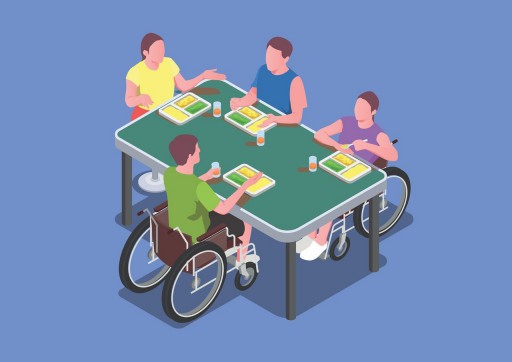Breaking Barriers: The Importance of Inclusive Special Education Programs
Understanding special education
Special education is a vital component of our educational system that aims to provide support and tailored instruction to students with diverse learning needs. It is a field that caters to the unique requirements of children with disabilities, enabling them to access education on an equal footing with their peers. Special education programs are designed to address the individual strengths and challenges of each student, ensuring that they receive the necessary accommodations and modifications to succeed academically and socially.
Inclusive special education programs take this concept a step further by promoting the inclusion of students with disabilities in general education classrooms. These programs strive to break down barriers and create an environment where all students can learn together, regardless of their abilities. By fostering inclusivity, special education programs not only benefit students with disabilities but also contribute to the overall growth and development of every student involved.
The importance of inclusive special education programs
Inclusive special education programs play a crucial role in creating an educational system that is fair, equitable, and supportive of all students. By providing inclusive environments, these programs ensure that no student is left behind or excluded based on their abilities. Inclusive education promotes diversity and celebrates the unique contributions of individuals with disabilities, fostering a sense of belonging and acceptance within the school community.
Moreover, inclusive special education programs offer numerous benefits to both students with disabilities and their typically developing peers. For students with disabilities, inclusion provides access to the general education curriculum, allowing them to learn alongside their peers and develop meaningful relationships. It also promotes the development of essential life skills, such as communication, self-advocacy, and social interaction.
For typically developing students, inclusive special education programs offer opportunities for empathy, understanding, and the development of a sense of social responsibility. These programs create an inclusive culture that values diversity and prepares students for the real world, where individuals with disabilities are an integral part of society. Inclusive education fosters a positive learning environment where students learn from one another and grow together.
Benefits of inclusive special education programs
Inclusive special education programs have proven to be highly beneficial for students with disabilities. Research shows that students who participate in inclusive education experience improved academic outcomes, increased self-esteem, and enhanced social skills. By being included in general education classrooms, these students have access to a broader range of educational resources and opportunities, which contribute to their overall growth and success.
Inclusive special education programs also benefit typically developing students. Studies have found that students without disabilities who participate in inclusive classrooms exhibit greater empathy, understanding, and acceptance of diversity. These students develop a more inclusive mindset and learn to appreciate different abilities and perspectives. Additionally, inclusive education promotes the development of leadership skills, as typically developing students often take on roles as peer mentors or helpers for their classmates with disabilities.
Furthermore, inclusive special education programs benefit the entire school community. By embracing inclusion, schools create a culture of acceptance and respect that extends beyond the classroom walls. Teachers, administrators, and support staff become more attuned to the diverse needs of students and develop inclusive teaching practices that benefit all learners. Inclusive education fosters a sense of belonging and unity among students, parents, and educators, creating a positive school climate that promotes student success.

Challenges in creating inclusive special education programs
While inclusive special education programs offer numerous benefits, they also come with challenges that need to be addressed. One of the main challenges is the lack of resources and funding. Inclusive education requires additional supports, such as specialized instructional materials, assistive technology, and trained personnel. However, many schools struggle to secure the necessary resources to effectively implement inclusive programs, resulting in limited support for students with disabilities.
Another challenge is the need for professional development and training for teachers and staff. Inclusive education requires a shift in instructional strategies and a deep understanding of individual students’ needs. Teachers need the skills and knowledge to differentiate instruction, modify curriculum, and provide appropriate accommodations. Ongoing professional development opportunities and collaboration among educators are essential to ensure that inclusive special education programs are successful.
Additionally, attitudinal barriers and misconceptions about disabilities can hinder the implementation of inclusive special education programs. Some educators, parents, and community members may hold negative beliefs or biases towards students with disabilities, which can impact the inclusivity of the learning environment. Addressing these attitudes and promoting awareness and acceptance are vital for creating a truly inclusive educational system.
Strategies for implementing inclusive special education programs
Implementing inclusive special education programs requires a comprehensive approach that considers the needs of all students. Here are some strategies that can help create successful inclusive environments:
- Collaboration and teamwork: Foster collaboration among educators, support staff, and parents to ensure a cohesive approach to inclusive education. Regular communication and sharing of expertise can lead to better outcomes for students.
- Universal design for learning (UDL): Implement UDL principles to create flexible learning environments that accommodate diverse learning needs. UDL emphasizes multiple means of representation, expression, and engagement to meet the individual needs of students.
- Individualized Education Programs (IEPs): Develop IEPs that reflect the goals, strengths, and needs of each student. IEPs should be regularly reviewed and updated to ensure that students receive appropriate accommodations and modifications.
- Assistive technology: Utilize assistive technology tools and resources to support students with disabilities in accessing the curriculum and participating in classroom activities. This may include specialized software, communication devices, or adaptive equipment.
- Peer support and collaboration: Encourage peer support and collaboration among students. Peer mentors and buddies can provide social and academic support to students with disabilities, fostering a sense of belonging and inclusion.
The role of teachers in inclusive special education programs
Teachers play a pivotal role in the success of inclusive special education programs. They are responsible for creating an inclusive learning environment, designing and implementing individualized instruction, and fostering positive relationships with students and their families. Here are some key aspects of a teacher’s role in inclusive education:
- Differentiation of instruction: Teachers need to differentiate instruction to meet the diverse needs of students. This involves varying instructional strategies, materials, and assessment methods to ensure that every student can access the curriculum and demonstrate their learning.
- Collaboration with support staff: Teachers collaborate with support staff, such as special education teachers, speech therapists, and occupational therapists, to provide the necessary accommodations and interventions for students with disabilities. Regular communication and teamwork are essential for effective collaboration.
- Building inclusive classroom communities: Teachers create a classroom culture that celebrates diversity and promotes acceptance. They foster positive relationships among students, encourage empathy and understanding, and address any instances of bullying or exclusion.
- Individualized Education Programs (IEPs): Teachers play a crucial role in developing, implementing, and monitoring IEPs. They work closely with students, parents, and other professionals to ensure that IEP goals are met and appropriate accommodations are provided.
- Ongoing professional development: Teachers should engage in ongoing professional development to stay updated on best practices in inclusive education. They should seek opportunities to expand their knowledge and skills in supporting students with disabilities.
The impact of inclusive special education programs on students
The impact of inclusive special education programs on students is far-reaching and profound. These programs provide students with disabilities the opportunity to learn and grow alongside their typically developing peers, promoting academic, social, and emotional development. Here are some key ways in which inclusive education positively impacts students:
- Academic achievement: Students with disabilities who participate in inclusive education often experience improved academic outcomes. Inclusive classrooms provide access to a broader range of instructional strategies and resources, allowing students to reach their full potential.
- Social and emotional development: Inclusive special education programs foster the development of social and emotional skills in students with disabilities. By interacting with their typically developing peers, students learn important social skills, such as communication, cooperation, and problem-solving.
- Self-esteem and self-advocacy: Inclusive education promotes the development of self-esteem and self-advocacy skills in students with disabilities. When students feel included and supported, they gain confidence in their abilities and learn to advocate for themselves effectively.
- Positive attitudes towards diversity: Inclusive education cultivates positive attitudes towards diversity and disabilities in all students. Typically developing students learn to appreciate individual differences, develop empathy, and become advocates for inclusivity in society.
- Preparation for adult life: Inclusive special education programs prepare students with disabilities for adult life by providing them with the skills and experiences necessary for independence and self-sufficiency. These programs focus on developing essential life skills, such as problem-solving, decision-making, and self-determination.
Support services for inclusive special education programs
Inclusive special education programs require a range of support services to ensure that students with disabilities receive the necessary accommodations and interventions. These support services may include:
- Special education teachers: Special education teachers play a crucial role in inclusive education by providing specialized instruction, adapting curriculum materials, and supporting students with disabilities in the general education classroom.
- Related services: Related services, such as speech therapy, occupational therapy, and physical therapy, are essential for students with disabilities to address their specific needs and ensure their full participation in the curriculum.
- Assistive technology: Assistive technology devices and software can support students with disabilities in accessing the curriculum, communicating, and participating in classroom activities. These tools enhance independence and promote inclusion.
- Paraprofessionals: Paraprofessionals, also known as teacher assistants or aides, provide additional support to students with disabilities in inclusive classrooms. They may assist with instructional tasks, behavior management, or personal care.
- Parent involvement: Parents play a critical role in supporting the inclusion of their child with disabilities. They collaborate with teachers, attend meetings, and advocate for their child’s needs to ensure a successful inclusive education experience.
Success stories from inclusive special education programs
Inclusive special education programs have yielded numerous success stories, demonstrating the transformative power of inclusive education. These success stories highlight the achievements and progress of students with disabilities who have thrived in inclusive environments. Here are a few inspiring examples:
- Emma, a student with autism, successfully completed high school in an inclusive setting. With the support of her teachers and peers, she developed strong communication skills, participated in extracurricular activities, and went on to pursue a degree in graphic design.
- James, a student with Down syndrome, excelled in an inclusive elementary school. With the help of his supportive teachers and classmates, James became an active participant in the classroom, developed strong friendships, and gained confidence in his abilities. He is now a successful entrepreneur, running his own small business.
- Sarah, a student with a learning disability, benefited from inclusive education throughout her schooling. Through differentiated instruction and accommodations, she was able to access the curriculum and excel academically. Sarah went on to pursue a degree in education and is now a passionate advocate for inclusive education.
These success stories demonstrate that inclusive special education programs have the power to transform lives, provide equal opportunities, and empower students with disabilities to achieve their full potential.





